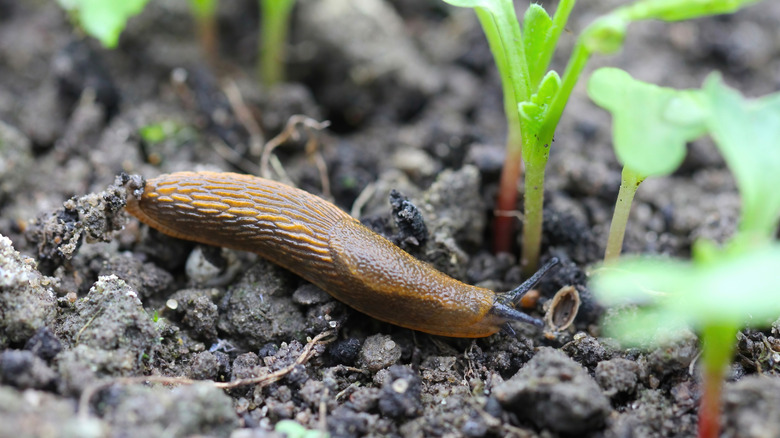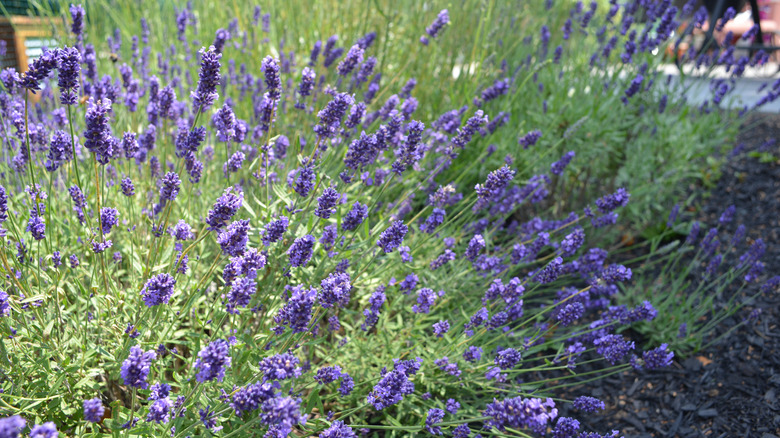How To Get Rid Of Slugs In The Garden (& Mistakes To Avoid)
Slugs can be a big garden menace, leaving small holes in your fruits and vegetables in their slimy wake. Fortunately, you can get rid of them safely with a variety of methods. Effective techniques include attracting their natural predators, using barriers, trapping them, and making your garden inhospitable. However, in their frustration with slugs, many gardeners make mistakes as they rush to eradicate them. Using toxic ingredients or salt, as well as faulty application, are all common mistakes you should avoid.
Getting rid of slugs in the garden can be a complicated process. They're nocturnal creatures, so it's hard to catch them in the act. Therefore, you might only see the evidence of garden slugs in the morning after the damage is done. Yet, it's important to get rid of slugs, not just to save your garden and flowers, but also your pets' health. In some areas such as Hawaii and the Southern U.S., slugs can carry the rat lungworm parasite, and if your dog eats them or their larvae, it can potentially cause a serious infection. Save your plants and reduce the chances of your dog consuming a parasite-ridden slug with these tips for keeping slugs out of your garden.
Natural ways to get rid of slugs
If challenged by slugs in your plants, you can introduce enemies for population control. Attract birds to your garden, enticing them to hopefully make a mollusk buffet. Blackbirds, starlings, and robins all enjoy slugs. Make the area welcoming for feathered friends with bird baths, feeders, and with bird-attracting plants. The same applies to ground beetles, beneficial pests that regularly consume slugs. Consider welcoming ground beetles by planting flowering, pollinator-friendly plants in your garden.
While you're busy making your garden more attractive for birds, you can also do the opposite for undesired slimy occupants. Copper is a popular deterrent due to the electrical shock sensation it produces upon contact with slugs' mucus. You can use either tape or mesh made with copper to prevent slugs from bothering your garden, but whichever method you select needs to be effective in size. Use too little or small a strip, and the slug will simply go around the area. If you have small children or pets around, make sure you don't have any sharp edges where they could cause injury.
Continue your slug removal plan with a few simple traps. One common option is to fill a shallow dish with beer as bait, and then bury the dish, so that dirt covers all but a ½ inch of the rim. The smell of the yeast in beer draws in the slugs, and they drown as they try to drink the liquid. Some gardeners prefer using sugary juices instead for the same effect.
Making your garden inhospitable to slugs (and mistakes to avoid)
Focus on making your garden hostile to slugs, so they depart for greener pastures, er, gardens. Add detestable plants, such as creeping Phlox (Phlox stolonifera), oatgrass (Helictotrichon), lavender (Lavandula angustifolia), and rosemary (Rosmarinus officinalis). Switch to morning watering, so plants will be less moist at night, and water only at the roots. Slugs are prolific breeders, often capable of laying 500 eggs annually, so these changes will eliminate the wet spots they need for their young. Overall, make your garden more open and airy and avoid heavy layers of mulch or leaves in the garden, as these are potential slug shelters.
Using poison is a popular mistake when trying to get rid of slugs. Many commercially available poison pellets comprise bran or molasses mixed with metaldehyde, an extremely toxic poison for animals and humans. Pets may think the pellets are kibble and accidentally ingest them. The powdered form isn't any better, as your pet's paws may pick up the residue, and they may ingest it while grooming. Metaldehyde is also only a temporary solution, as sunlight and rain may deactivate it. The more you reapply, the greater ingestion risk; this can lead to metaldehyde toxicity, which can cause seizures, hypersensitivity, and an extreme elevation of body temperature. Even a teaspoon of metaldehyde can cause severe compilations and death. Don't use salt to kill slugs, either, because salt can damage your soil. The high sodium can kill or hurt your plants and affect the soil's water retention.


